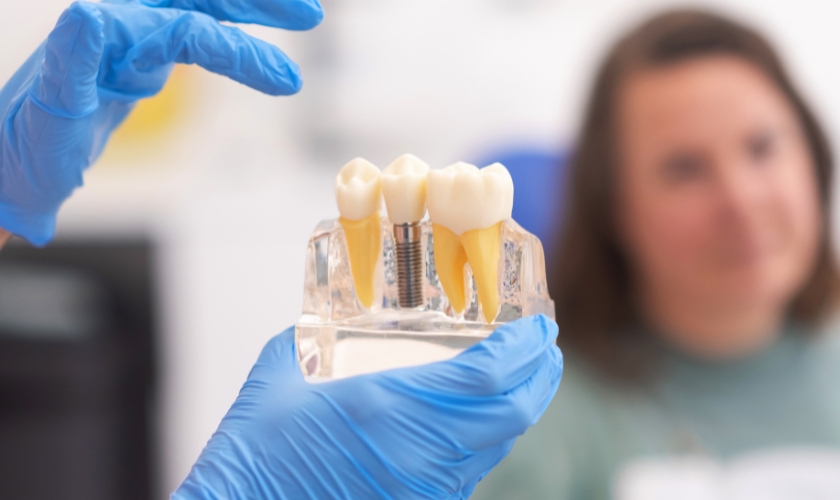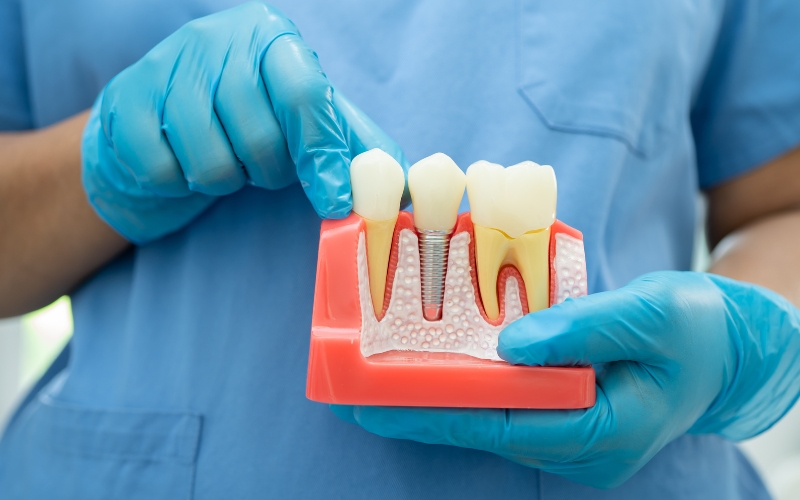We are Not A MassHealth Provider
Can You Get Dental Implants If You Have Gum Disease in Holden? What You Need to Know

Dental implants offer a permanent solution to missing teeth, giving you a natural look and feel. However, if you have gum disease, you may wonder if dental implants are still an option. Gum disease can affect the procedure’s success, but with the right care and treatment plan, you can still enjoy the benefits of dental implants Holden. Let’s break down the facts and give you all the information you need to make an informed decision.
What Is Gum Disease and How Does It Affect Your Teeth?
Gum or periodontal disease is an infection of the gums that can affect the tissue supporting your teeth. It starts with gingivitis, a mild form of gum disease, and if left untreated, it can progress to periodontitis. In severe cases, the bone structure that supports your teeth may be lost.
Dental implants’ success heavily relies on healthy gums and strong bones. Gum disease could compromise both of these, making implants riskier.
Can You Still Get Dental Implants If You Have Gum Disease?
Yes, it is possible to get dental implants even if you have gum disease, but it depends on the severity of the condition. If gum disease is mild or moderate, your dentist may recommend treatments to restore gum health before proceeding with implants. Additional procedures, such as bone grafting, may be necessary in severe cases.
A thorough evaluation by a professional is essential to determine whether your gums and bones are healthy enough to support implants. Gum disease treatment and implant placement can often happen in stages to ensure success.
The Role of Gum Disease Treatment Before Implants
Addressing any existing gum disease is crucial before considering dental implants Holden. Your dentist may suggest deep cleaning (scaling and root planing) or other periodontal treatments to help eliminate infection.
Treating gum disease first is important because it reduces the risk of implant failure. Infected gums and weakened bone structure can prevent the implant from properly fusing with the jaw, which is essential for its longevity.
Bone Grafting: An Important Step for Severe Cases
In some cases of advanced gum disease, bone loss may occur, making placing a dental implant complex. Bone grafting can help rebuild the lost bone and create a solid foundation for the implant.
Bone grafts are usually taken from your own body, a donor, or synthetic materials. Once the graft material is in place, the bone will need time to heal and integrate with the existing bone. Only after sufficient healing will your dentist proceed with the dental implant procedure.
The Procedure for Dental Implants After Gum Disease Treatment
The dental implant procedure will begin once your gums are healthy, and your bone structure is sufficient. Here’s a brief overview of the process:
- Consultation and Assessment: Your dentist will assess your gum health and overall implant suitability.
- Treatment of Gum Disease: Gum disease will be treated and managed if necessary.
- Bone Grafting: If bone is lost, bone grafting will help rebuild the bone.
- Implant Placement: The dental implant will be surgically placed into the jawbone.
- Healing and Integration: Over time, the implant will fuse with the bone in a process known as osseointegration.
- Final Restoration: After healing, your new tooth (or teeth) will be placed on the implant.
Risks and Considerations for Dental Implants with Gum Disease
While dental implants are generally safe, there are certain risks when gum disease is involved. The primary concern is infection, which could lead to implant failure. If gum disease isn’t fully treated before implant placement, bacteria can infect the implant, preventing it from fusing correctly.
To minimize risks, your dentist will closely monitor the health of your gums throughout the entire process, ensuring that any potential issues are addressed quickly.
The Importance of Regular Check-Ups and Aftercare
Once your dental implants are placed, regular follow-up visits are essential to monitor the health of your gums and the success of the implants. Maintaining a good oral hygiene routine, including brushing, flossing, and possibly using antimicrobial mouthwash, will help prevent gum disease from recurring. Routine check-ups with your dentist will also ensure any issues are detected early.
While gum disease can make getting dental implants more challenging, it is not impossible. You can successfully receive dental implants Holden with the right treatment plan, including gum disease treatment, bone grafting, and careful monitoring.
Contact us today to schedule a consultation and explore how we can help you achieve a healthier smile with dental implants. Don’t let gum disease hold you back—start your journey to a restored smile today!




